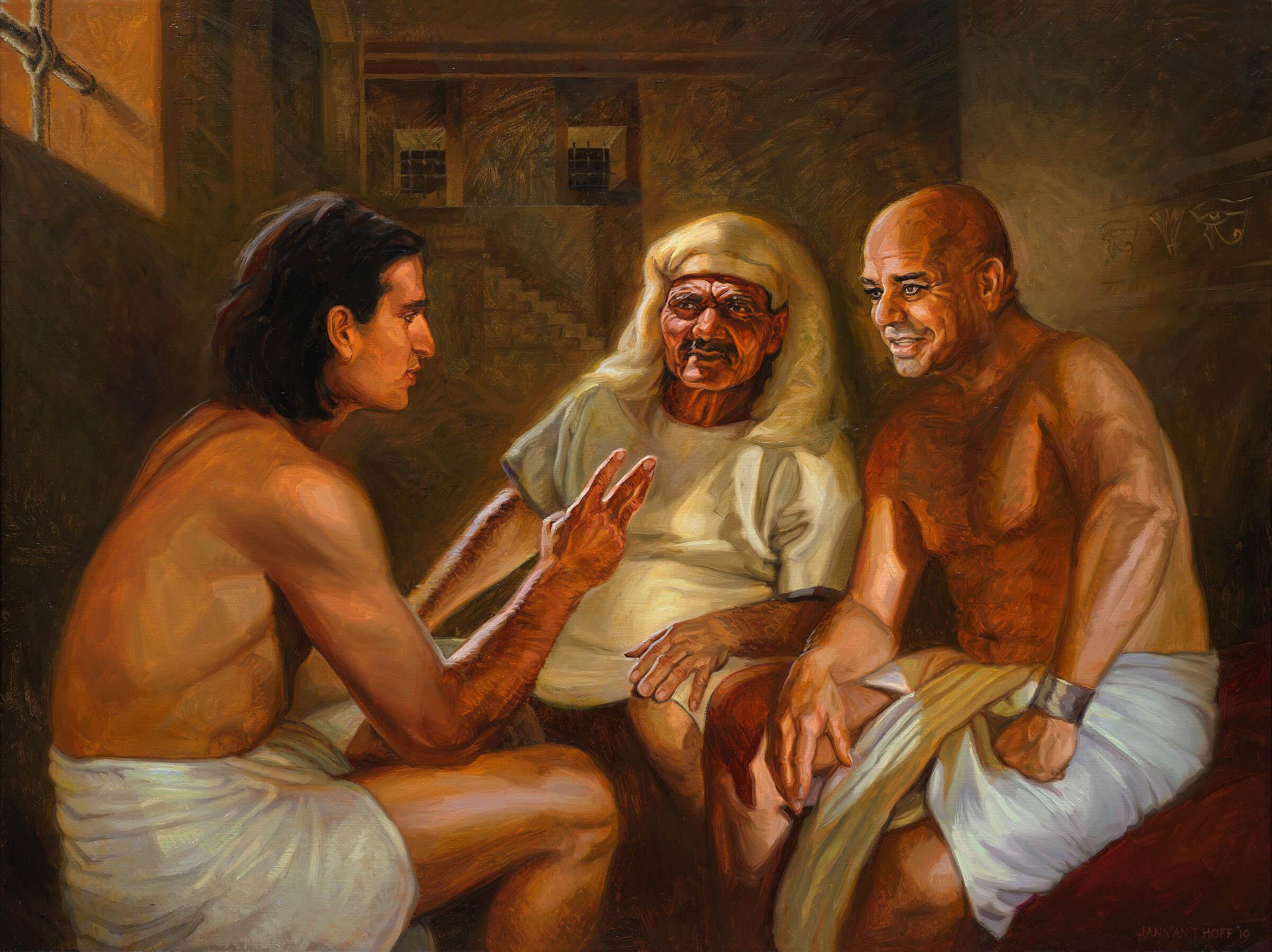Gospelimages is committed to share the Biblical message as widely as possible via paintings, but not for profit.
Via the webshop it is possible to purchase high quality reproductions printed on canvas (giclées) of the painting of your choice.
All royalty proceeds will be made available to GlobalRize, "reaching the world for Christ online".
www.globalrize.org You are now leaving this website.
Back to index
Download the image for free
prefer a print on canvas?
Joseph in prison with the cupbearer and the baker
Genesis 40:13
Within three days Pharaoh will lift up your head and restore you to your position, and you will put Pharaoh’s cup in his hand, just as you used to do when you were his cupbearer.Full bible text
Genesis 40 verse 1 to 8
1 Some time later, the cupbearer and the baker of the king of Egypt offended their master, the king of Egypt.
2 Pharaoh was angry with his two officials, the chief cupbearer and the chief baker
2 Pharaoh was angry with his two officials, the chief cupbearer and the chief baker
3 and put them in custody in the house of the captain of the guard, in the same prison where Joseph was confined.
4 The captain of the guard assigned them to Joseph, and he attended them. After they had been in custody for some time,
5 each of the two men - the cupbearer and the baker of the king of Egypt, who were being held in prison - had a dream the same night, and each dream had a meaning of its own.
6 When Joseph came to them the next morning, he saw that they were dejected.
6 When Joseph came to them the next morning, he saw that they were dejected.
7 So he asked Pharaoh’s officials who were in custody with him in his master’s house: “Why do you look so sad today?”
8 “We both had dreams,” they answered, “but there is no one to interpret them.” Then Joseph said to them: “Do not interpretations belong to God? Tell me your dreams.”
8 “We both had dreams,” they answered, “but there is no one to interpret them.” Then Joseph said to them: “Do not interpretations belong to God? Tell me your dreams.”
About this painting
Joseph is taken away to Egypt and sold as a slave to Potiphar, a court dignitary of the pharaoh. After being falsely accused by Potiphar’s wife, who claims she has been violated, he is imprisoned.
In prison he meets the pharaoh’s cupbearer and baker, who had been put into custody as well. Joseph is made their servant.
One day both the cupbearer and the baker wake up after having dreamt mysterious dreams. Joseph offers to interpret their dreams. The interpretation, which belonged to God, afterwards proves to be accurate.
After three days, the cupbearer is restored to his position at the pharaoh’s court, whereas the baker is hanged.
The number 3, indicated by Joseph’s hand gesture in the painting, appears to be crucial in the interpretation.
Parallels with the life of Jesus:
Jesus too resisted temptations
Genesis 39 verse 9, compared with Matthew 4 verse 1 to 12.
Jesus too was falsely accused. Genesis 39 verse 13 to 18, compared with Matthew 26 verse 59 to 65.
Jesus too was deeply humiliated, before being exalted as King.
Genesis 41 verse 14 and further compared with
Ephisians 2 verse 20 and 21. Hebrews 2 verse 9.
Through the interpretation of dreams a prophetic element becomes apparent in the life of Joseph. Jesus is the great Prophet:
Isaiah 11 verse 2:
The Spirit of the LORD will rest on Him,
the Spirit of wisdom and of understanding,
the Spirit of counsel and of might,
the Spirit of the knowledge and fear of the LORD.
Compared with
Isaiah 9 verse 5.
Daniel 5 verse 12.
Luke 4 verse 18 to 22.
In prison he meets the pharaoh’s cupbearer and baker, who had been put into custody as well. Joseph is made their servant.
One day both the cupbearer and the baker wake up after having dreamt mysterious dreams. Joseph offers to interpret their dreams. The interpretation, which belonged to God, afterwards proves to be accurate.
After three days, the cupbearer is restored to his position at the pharaoh’s court, whereas the baker is hanged.
The number 3, indicated by Joseph’s hand gesture in the painting, appears to be crucial in the interpretation.
Parallels with the life of Jesus:
Jesus too resisted temptations
Genesis 39 verse 9, compared with Matthew 4 verse 1 to 12.
Jesus too was falsely accused. Genesis 39 verse 13 to 18, compared with Matthew 26 verse 59 to 65.
Jesus too was deeply humiliated, before being exalted as King.
Genesis 41 verse 14 and further compared with
Ephisians 2 verse 20 and 21. Hebrews 2 verse 9.
Philippians 2 verse 8 and 9.
Through the interpretation of dreams a prophetic element becomes apparent in the life of Joseph. Jesus is the great Prophet:
Isaiah 11 verse 2:
The Spirit of the LORD will rest on Him,
the Spirit of wisdom and of understanding,
the Spirit of counsel and of might,
the Spirit of the knowledge and fear of the LORD.
Compared with
Isaiah 9 verse 5.
Daniel 5 verse 12.
Luke 4 verse 18 to 22.